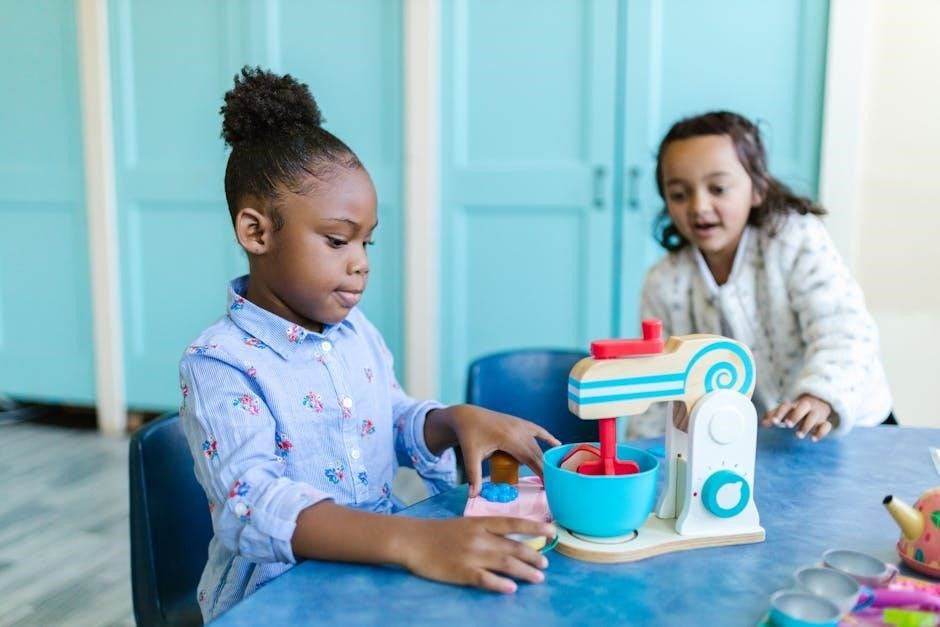Social-Emotional Learning (SEL) focuses on developing essential life skills, such as managing emotions, building relationships, and making responsible decisions․ It enhances students’ well-being and academic success through activities like emotion recognition, group games, and role-playing, fostering a supportive and inclusive classroom environment․ Free PDF resources, including worksheets and lesson plans, are widely available to integrate SEL into daily teaching practices, ensuring accessibility for all educators and students․ These tools promote social awareness, self-management, and relationship skills, creating a strong foundation for personal and academic growth․ By incorporating SEL, educators empower students to navigate challenges confidently and collaboratively, preparing them for future successes․ The use of digital and interactive materials, such as videos and online kits, further enriches the learning experience, making SEL engaging and effective for diverse age groups and learning styles․ Through consistent implementation, SEL activities help students develop resilience, empathy, and a growth mindset, essential for thriving in an ever-changing world․ Educators can easily find and utilize these resources to create a safe and nurturing environment that supports the holistic development of every student․ By prioritizing SEL, schools cultivate a culture of understanding and cooperation, where students feel valued and prepared to succeed in all aspects of life․ The availability of free and accessible SEL materials ensures that all classrooms can benefit from these transformative practices, regardless of budget constraints․ As a result, SEL has become a cornerstone of modern education, shaping the next generation of compassionate and capable individuals․ The future of education lies in nurturing both the academic and emotional intelligence of students, and SEL activities play a pivotal role in achieving this balance․ With the right tools and strategies, educators can seamlessly integrate SEL into their curriculum, ensuring that every student has the opportunity to thrive․ The impact of SEL extends beyond the classroom, influencing students’ relationships, mental health, and overall life satisfaction․ By investing in SEL, schools invest in the well-rounded development of their students, creating a lasting positive impact on their futures․ The widespread adoption of SEL activities reflects a growing recognition of the importance of emotional intelligence in fostering a healthy and productive society․ As education evolves, SEL remains a vital component, equipping students with the skills they need to navigate an increasingly complex world․ Through innovative resources and dedicated teaching practices, the benefits of SEL are being realized in classrooms worldwide, inspiring a brighter future for all learners․
1․1 Importance of SEL in Modern Education
Social-Emotional Learning (SEL) is crucial in modern education as it addresses the growing need for students to develop emotional intelligence and interpersonal skills․ With increasing pressures in academics and social interactions, SEL helps students manage stress, build resilience, and foster positive relationships․ It creates a safe and inclusive classroom environment, promoting a sense of belonging and academic engagement․ By teaching skills like empathy, self-awareness, and decision-making, SEL equips students to navigate real-world challenges effectively․ Free PDF resources, such as worksheets and lesson plans, make it accessible for educators to integrate SEL into their curriculum․ This focus on emotional and social growth not only enhances academic performance but also prepares students for future personal and professional success, making SEL a cornerstone of 21st-century education․
1․2 Benefits of SEL Activities for Students
Social-Emotional Learning (SEL) activities provide numerous benefits for students, enhancing their emotional and social development․ These activities foster self-awareness, allowing students to recognize and manage their emotions effectively․ They also improve relationship skills, encouraging collaboration, empathy, and conflict resolution․ SEL activities promote responsible decision-making, helping students navigate challenges and make positive choices․ By fostering a sense of belonging, SEL reduces stress and anxiety, creating a more focused and engaged learner․ Free PDF resources, such as worksheets and lesson plans, make these activities accessible to all educators․ Overall, SEL activities empower students to build resilience, develop healthy relationships, and achieve both academic and personal success, preparing them for lifelong challenges and opportunities․ These benefits create a strong foundation for students to thrive in school and beyond․

Key Competencies of Social-Emotional Learning
Social-Emotional Learning (SEL) focuses on five core competencies: self-awareness, self-management, social awareness, relationship skills, and responsible decision-making․ These skills help students navigate personal and academic challenges effectively, fostering emotional intelligence and interpersonal success․
2․1 Self-Awareness
Self-awareness is the ability to recognize and understand one’s emotions, values, and strengths․ It involves identifying how emotions influence behavior and decision-making․ Activities like emotion recognition exercises and journaling help students develop this skill․ Free PDF resources, such as social stories and emotional regulation tools, provide guided lessons to enhance self-awareness․ By understanding their emotions and personal motivations, students can better navigate challenges and develop a positive self-image․ These tools foster a deeper understanding of oneself, laying the foundation for other SEL competencies․ Classroom activities, such as creating emotion charts or reflecting on personal experiences, encourage students to explore their feelings and thoughts․ This awareness helps students take ownership of their actions and decisions, promoting personal growth and emotional intelligence․ Self-awareness is a cornerstone of SEL, enabling students to understand themselves and their place in the world․
2․2 Self-Management
Self-management involves regulating one’s emotions, behaviors, and thoughts to achieve goals and well-being․ It includes skills like stress management, self-motivation, and self-control․ Free PDF resources, such as emotional regulation tools and worksheets, provide structured activities to help students identify and manage their emotions․ Techniques like deep breathing exercises, mindfulness practices, and goal-setting templates empower students to maintain focus and composure․ These tools guide students in recognizing emotional triggers and developing strategies to respond appropriately․ By fostering self-management, educators help students build resilience and develop habits that promote academic and personal success․ Accessible PDF materials make it easy for teachers to integrate these practices into daily routines, ensuring students can effectively manage their emotions and behaviors in all situations․ This competency is vital for students to navigate challenges and maintain a positive mindset․
2․3 Social Awareness
Social awareness is the ability to understand and respect the perspectives of others, fostering empathy and inclusivity․ It involves recognizing diversity, cultural differences, and social norms․ Free PDF resources, such as social stories and group activities, help students develop this skill․ Worksheets encourage students to reflect on others’ feelings and experiences, while role-playing scenarios simulate real-life interactions․ These tools teach students to listen actively, cooperate with peers, and navigate conflicts constructively․ By promoting social awareness, educators create a classroom environment where students feel valued and connected․ Accessible materials ensure that all educators can easily integrate these practices, helping students build strong interpersonal skills and a sense of community․ This competency is essential for fostering positive relationships and a supportive learning environment․
2․4 Relationship Skills
Relationship skills involve the ability to communicate effectively, cooperate with others, and build strong connections․ These skills are cultivated through activities like group games, role-playing, and collaborative projects․ Free PDF resources, such as worksheets and lesson plans, provide structured exercises to enhance these abilities․ Students learn to express emotions clearly, listen actively, and resolve conflicts constructively․ Additionally, these materials teach students to resist negative social pressures and seek help when needed․ By fostering relationship skills, educators help students navigate social dynamics and develop empathy․ Accessible tools ensure that teachers can easily integrate these practices into their classrooms, promoting a culture of mutual respect and cooperation․ These skills are vital for students to form positive relationships and thrive in collaborative environments, both academically and socially․
2․5 Responsible Decision-Making
Responsible decision-making is a core SEL competency that equips students to make thoughtful choices․ Free PDF resources, such as interactive worksheets and scenario-based activities, guide students in evaluating consequences and considering ethical implications․ These tools help students weigh pros and cons, develop problem-solving strategies, and reflect on the impact of their decisions․ Group activities and role-playing exercises encourage students to practice decision-making in real-life contexts, fostering accountability and empathy․ By integrating these materials, educators empower students to navigate challenges confidently and make informed choices that align with their values and goals․ These resources are designed to be adaptable, ensuring students across various age groups can develop the critical thinking and self-awareness needed for responsible decision-making in all aspects of life․
Free SEL Activities for the Classroom
Free SEL activities, such as emotion management exercises, group games, and role-playing scenarios, are accessible for classrooms․ These tools create a safe and inclusive learning environment, fostering social-emotional growth and promoting a sense of belonging among students․
3․1 Emotion Recognition and Management Exercises
Emotion recognition and management exercises are foundational SEL activities that help students identify, understand, and regulate their emotions․ These exercises often include tools like emotion bingo, feeling charts, and journaling prompts․ Free PDF resources, such as social stories and interactive worksheets, provide structured ways for students to explore emotions․ Activities like “Feelings Sorting Games” and “Emotion Charades” encourage students to recognize and express emotions in a safe environment․ Journaling exercises, such as writing about intense emotions or gratitude, foster self-awareness and reflection․ These exercises also teach coping strategies, helping students manage stress and anxiety․ By integrating these tools, educators create a supportive classroom culture where students can develop emotional resilience and empathy․ Such practices ensure students are better equipped to navigate emotional challenges and build strong relationships with peers․ Free PDF resources make these exercises accessible to all educators, promoting consistency and engagement in SEL implementation․
3․2 Group Games for Relationship Building
Group games are a dynamic way to foster relationship skills and social awareness among students․ Activities like “Human Bingo” and “The Kindness Chain” encourage collaboration, empathy, and communication․ These games help students build connections by sharing experiences and perspectives․ Free PDF resources, such as printable game cards and instructions, make these exercises accessible to educators․ Games like “Group Mural Creation” or “Team Trivia” promote teamwork and problem-solving, while “Feelings Charades” enhances emotional understanding․ These interactive exercises create a sense of belonging and trust, fostering a positive classroom environment․ By engaging in these activities, students develop essential relationship skills, such as active listening and conflict resolution, which are vital for lifelong social success․ Educators can easily integrate these games into their SEL curriculum using freely available materials, ensuring all students benefit from these engaging experiences․
3․3 Role-Playing Scenarios for Social Skills
Role-playing scenarios are a powerful tool for teaching social skills, allowing students to practice real-life interactions in a safe environment․ Activities like acting out conflict resolution or peer pressure situations help students develop empathy and communication skills․ Educators can use free PDF resources, such as scripted scenarios or prompt cards, to guide these exercises․ For example, role-playing how to handle bullying or teamwork challenges encourages active problem-solving․ These exercises also foster self-awareness and relationship skills, as students learn to navigate different perspectives․ By engaging in these scenarios, students build confidence in expressing emotions and cooperating with others․ Free downloadable materials make it easy to implement these activities, ensuring students gain valuable social skills through interactive and meaningful practice․

Digital and Interactive SEL Resources
Digital tools like interactive PDFs, SEL games, and videos offer engaging ways to teach social-emotional skills․ These resources support diverse learning styles and make lessons dynamic․
4․1 Interactive PDF Worksheets
Interactive PDF worksheets are versatile tools for teaching social-emotional learning (SEL) skills․ They often include exercises like emotion recognition, self-awareness prompts, and relationship-building activities․ Many free resources, such as printable social stories and emotion management guides, are available online․ These worksheets are designed to be engaging and easy to use, requiring minimal preparation․ They cater to various age groups, from elementary to high school students, and cover topics like self-management, empathy, and decision-making․ Teachers can use these worksheets to help students identify and manage their emotions, develop self-awareness, and improve social interactions․ Interactive PDFs also allow for digital completion, making them adaptable to both in-class and remote learning environments․ By incorporating these resources, educators can provide structured yet flexible opportunities for students to practice SEL skills effectively․ These worksheets are a valuable addition to any SEL curriculum, offering practical and accessible learning experiences for all students․
4․2 SEL Games and Videos
SEL games and videos are engaging tools that make learning social-emotional skills fun and interactive․ Resources like Emotions BINGO and empathy-building videos help students recognize and manage emotions․ These activities are designed to foster self-awareness, relationship skills, and responsible decision-making․ Videos often feature relatable scenarios or characters, making complex concepts accessible to students of all ages․ Games such as “Feelings Charades” or “Kindness Challenges” encourage collaboration and reflection․ Many of these resources are free and easily accessible online, providing educators with a variety of options to suit different learning styles․ By integrating games and videos into the curriculum, teachers can create dynamic lessons that captivate students’ attention while promoting emotional intelligence and social competence․ These tools are particularly effective for younger learners, as they combine entertainment with education, making SEL practices both enjoyable and impactful․ They also support diverse learning environments, ensuring all students can benefit from SEL activities․
4․4 Online SEL Activity Kits
Online SEL activity kits provide comprehensive, ready-to-use resources for educators, offering a variety of engaging activities to promote social-emotional growth․ These kits often include games, role-playing scenarios, and reflection exercises designed to foster empathy, self-awareness, and responsible decision-making․ Many kits are available for free and cater to different age groups, ensuring accessibility for elementary, middle, and high school students․ They typically feature structured lesson plans, making it easy for teachers to integrate SEL into their curriculum․ Activities like “Kindness Challenges” or “Feelings BINGO” encourage collaboration and emotional intelligence․ These kits also include downloadable PDF materials, such as worksheets and social stories, to support diverse learning needs․ By providing a structured approach, online SEL activity kits help create a positive classroom culture, empowering students to navigate social and emotional challenges effectively․ They are a valuable resource for educators aiming to promote holistic student development․
SEL Activities for Different Age Groups
SEL activities are tailored for elementary, middle, and high school students, offering age-specific exercises like storytelling for younger learners and reflective journaling for older students, fostering emotional growth․
5․1 Elementary School SEL Activities
Elementary school SEL activities focus on foundational skills like emotion recognition and social awareness through engaging, age-appropriate exercises․ Games such as “Emotion Charades” and “Feelings BINGO” help young students identify and express emotions․ Storytelling and role-playing activities, like acting out scenarios involving kindness or sharing, foster empathy and relationship skills․ Teachers often use visual aids like emotion wheels or feeling charts to help students recognize and manage their emotions․ Group activities, such as collaborative puzzles or teamwork challenges, promote cooperation and communication․ Role-playing also introduces basic decision-making skills, such as resolving simple conflicts or taking turns․ These activities are supported by free PDF resources, including social stories, emotion cards, and classroom posters, making them accessible and easy to implement․ By incorporating these exercises, elementary educators create a nurturing environment that encourages social growth and emotional intelligence from an early age․
5․2 Middle School SEL Activities
Middle school SEL activities are designed to help students navigate the challenges of early adolescence, focusing on skills like self-management, relationship-building, and decision-making․ Interactive exercises such as “Peer Mediation” and “Group Decision-Making Challenges” encourage collaboration and problem-solving․ Role-playing scenarios address real-life issues, such as managing peer pressure or resolving conflicts, while reflective journaling activities help students process emotions and develop self-awareness․ Teachers can utilize free PDF resources, including discussion guides and scenario-based worksheets, to facilitate these lessons․ Activities like “Perspective-Taking Discussions” and “Empathy-Building Games” foster deeper understanding of others’ feelings and viewpoints․ These exercises not only strengthen social bonds but also equip students with the emotional resilience needed to thrive during this transitional phase of development, making SEL a cornerstone of middle school education․
5․3 High School SEL Activities
High school SEL activities focus on advanced social-emotional skills, such as leadership, conflict resolution, and independent decision-making․ Activities like “Debate Sessions on Real-Life Dilemmas” encourage critical thinking and perspective-taking․ “Peer-Led Workshops” empower students to share insights and strategies for managing stress and building healthy relationships․ Reflective journaling exercises, such as writing about personal values or long-term goals, help students develop self-awareness and clarity․ Case study analyses of real-world scenarios also foster empathy and responsible decision-making․ Free PDF resources, including lesson plans and discussion guides, provide structured support for these activities․ Additionally, “Service Learning Projects” integrate SEL with community engagement, teaching students the value of collaboration and social responsibility․ These activities prepare high school students for the challenges of adulthood by enhancing their emotional intelligence and interpersonal skills․

Classroom Implementation Strategies
Creating a safe environment, integrating SEL into daily routines, and using interactive PDF resources fosters a supportive classroom culture, promoting student engagement and emotional growth effectively․
6․1 Creating a Safe Learning Environment
Creating a safe learning environment is crucial for effective SEL implementation․ Establish clear expectations for respect, empathy, and open communication to foster trust among students․ Use visual reminders like classroom rules posters and social stories to reinforce positive behaviors․ Incorporate activities that promote a sense of belonging, such as group games and role-playing scenarios, to encourage collaboration and empathy․ Provide opportunities for students to express their emotions and concerns, ensuring they feel heard and supported․ Utilize free PDF resources, such as emotion recognition exercises and relationship-building worksheets, to guide these efforts․ A supportive educator plays a key role in modeling positive behaviors and addressing conflicts constructively․ By prioritizing safety and inclusivity, educators create a space where students feel comfortable exploring their emotions and developing social skills․ This foundation is essential for fostering resilience, academic success, and positive relationships․
6․2 Integrating SEL into Daily Routines
Integrating SEL into daily routines ensures consistent skill development and reinforces a positive classroom culture․ Start with morning check-ins or emotional weather reports to gauge students’ feelings․ Incorporate short activities like reflection journals or mindfulness exercises to encourage self-awareness․ Use transitions between lessons to practice social skills, such as active listening or conflict resolution․ Group games and role-playing can be woven into breaks or warm-ups to foster collaboration and empathy․ Free PDF resources, including worksheets and lesson plans, provide structured yet flexible tools to fit seamlessly into daily schedules․ Consistency is key; even brief moments dedicated to SEL can have a lasting impact․ By making SEL a part of everyday routines, educators help students develop essential skills while maintaining academic focus, creating a balanced and supportive learning environment․
6․3 Assessing Student Progress
Assessing student progress in SEL involves monitoring the development of key competencies like self-awareness, relationship skills, and responsible decision-making․ Teachers can use tools such as reflection journals, emotional check-ins, and group discussions to gauge growth․ Free PDF resources, such as worksheets and progress tracking templates, provide structured ways to evaluate student learning․ Observing participation in activities like role-playing or group games offers insights into social and emotional development․ Regular feedback and self-assessment exercises help students identify their strengths and areas for improvement․ By integrating these strategies, educators can ensure students are making progress and adjust instruction accordingly, fostering a supportive environment for continuous growth and development․

Free PDF Resources for SEL
Free PDF resources for SEL include social stories, worksheets, and lesson plans, offering accessible tools to support emotional growth and social skills development across all age groups;
7․1 Printable SEL Worksheets
Printable SEL worksheets are versatile tools designed to help students develop self-awareness, manage emotions, and improve social skills․ These no-prep resources are ideal for classrooms and home use, offering activities like emotion recognition exercises, self-reflection prompts, and relationship-building tasks․ Many worksheets focus on specific competencies, such as identifying emotions, practicing empathy, or solving conflicts․ They often include engaging visuals and age-appropriate language, making them accessible for elementary, middle, and high school students․ Educators can use these worksheets as standalone activities or integrate them into larger SEL lesson plans․ Worksheets also serve as valuable assessments, allowing teachers to gauge students’ understanding and progress in social-emotional learning․ Free PDF formats make them easily downloadable and adaptable to various learning environments, ensuring accessibility for all educators and students․ By incorporating these resources, educators can create structured opportunities for students to practice essential life skills in a supportive and engaging way․
7․2 SEL Lesson Plans
Social-Emotional Learning (SEL) lesson plans provide structured guidance for educators to integrate SEL into their curriculum․ These plans often include detailed activities, discussion prompts, and assessments to foster skills like self-awareness, empathy, and decision-making․ Many free PDF lesson plans are designed for specific age groups, ensuring relevance and effectiveness․ They align with educational standards and can be adapted to fit classroom needs․ Lessons may incorporate role-playing, group discussions, and reflective exercises to engage students․ Educators can use these plans to create a consistent SEL practice, promoting a positive classroom culture․ By following these lessons, teachers can help students develop essential life skills while reinforcing academic learning․ Free SEL lesson plans are a valuable resource for educators seeking to enhance student well-being and social-emotional growth․
7․3 Social Stories and Emotional Regulation Tools
Social stories and emotional regulation tools are essential resources for teaching students to manage emotions and behaviors․ These tools help students understand social cues, develop empathy, and navigate complex situations․ Social stories, often presented in free PDF formats, use relatable scenarios to guide students in appropriate responses․ Emotional regulation tools, such as feeling charts and mindfulness exercises, empower students to recognize and control their emotions․ These resources are particularly effective for students with special needs or those struggling with emotional challenges․ Educators can use these tools to create a nurturing environment, fostering self-awareness and self-management skills․ By integrating social stories and emotional regulation tools into daily routines, teachers can help students build resilience and improve interpersonal relationships․ These resources are widely available online, making them accessible for educators seeking to support students’ emotional and social growth․ They provide practical solutions for addressing emotional needs in the classroom, ensuring students feel understood and supported․ The combination of social stories and regulation tools creates a comprehensive approach to emotional learning, preparing students for real-world interactions․ These materials are adaptable to different age groups and learning styles, ensuring their effectiveness in diverse educational settings․ By leveraging these tools, educators can help students develop the emotional intelligence needed to thrive academically and personally․ The availability of free PDF resources ensures that all classrooms can benefit from these transformative materials, fostering a culture of emotional awareness and understanding․ Social stories and emotional regulation tools are invaluable assets for promoting social-emotional learning and student well-being․ They offer educators creative and effective ways to address emotional challenges, enabling students to navigate their feelings confidently․ With these tools, classrooms can become spaces where emotional growth and academic success go hand in hand, preparing students for lifelong success․ The impact of these resources extends beyond the classroom, influencing students’ relationships and overall quality of life․ By prioritizing emotional regulation and social understanding, educators empower students to overcome obstacles and achieve their full potential․ The widespread adoption of these tools reflects a growing commitment to holistic education, where both academic and emotional development are valued․ As a result, social stories and emotional regulation tools continue to play a vital role in shaping the emotional landscape of modern education․ Their accessibility and effectiveness make them indispensable for fostering a supportive and inclusive learning environment․ Through these resources, educators can help students build the emotional resilience needed to succeed in an ever-changing world․ The future of education lies in nurturing both the academic and emotional intelligence of students, and these tools are key to achieving that balance․ By incorporating social stories and emotional regulation tools into their practices, educators can create a lasting positive impact on their students’ lives․ The availability of free PDF resources ensures that these benefits are accessible to all, regardless of budget constraints․ As education evolves, these tools remain essential for equipping students with the skills they need to thrive emotionally and socially․ Through consistent use, educators can help students develop the self-awareness, empathy, and self-management necessary for a lifetime of success․ The integration of social stories and emotional regulation tools into daily teaching practices is a powerful step toward creating a more compassionate and resilient generation․ These resources are not just classroom aids but catalysts for personal growth and emotional well-being․ By embracing these tools, educators can help students navigate the complexities of emotions and relationships, laying the foundation for a brighter future․ The impact of social stories and emotional regulation tools is evident in the positive changes they bring to students’ lives, making them indispensable in modern education․ Their role in fostering emotional intelligence ensures that students are prepared to face challenges with confidence and empathy․ As a result, these resources are a cornerstone of social-emotional learning, providing educators with the means to create a supportive and inclusive classroom environment․ With their help, students can develop the skills needed to succeed in all aspects of life, from academics to personal relationships․ The future of education is rooted in the holistic development of students, and these tools are key to achieving that vision․ By utilizing social stories and emotional regulation tools, educators can empower students to embrace their emotions and build strong, meaningful connections with others․ These resources are a testament to the importance of emotional intelligence in fostering a healthy and productive society․ As education continues to evolve, the role of these tools will remain vital, ensuring that students are equipped with the skills necessary to thrive in an increasingly complex world․ Through innovative resources and dedicated teaching practices, the benefits of social stories and emotional regulation tools are being realized in classrooms worldwide, inspiring a brighter future for all learners․ The widespread adoption of these tools reflects a growing recognition of the importance of emotional intelligence in education, and their impact will be felt for generations to come․ By integrating these resources into their curriculum, educators can help students develop the resilience, empathy, and self-awareness needed to navigate life’s challenges with confidence․ The availability of free PDF resources ensures that these tools are accessible to all educators, regardless of their school’s budget, making them a democratizing force in education․ As a result, social stories and emotional regulation tools continue to be a vital part of the educational landscape, shaping the emotional and social development of students everywhere․ Their influence extends beyond the classroom, contributing to the creation of a more compassionate and emotionally intelligent society․ By prioritizing emotional learning, educators can help students build a strong foundation for future success, ensuring that they are prepared to face whatever challenges come their way․ The role of social stories and emotional regulation tools in this process cannot be overstated, as they provide practical and effective ways to nurture emotional intelligence․ As education moves forward, these resources will remain essential for fostering the well-rounded development of students, helping them to succeed not only academically but also personally․ The impact of these tools is a testament to the enduring importance of social-emotional learning in creating a brighter, more empathetic world․ By embracing these resources, educators can help students unlock their full potential, paving the way for a future filled with promise and possibility․ The integration of social stories and emotional regulation tools into daily teaching practices is a powerful step toward achieving this vision, ensuring that every student has the opportunity to thrive․
8․2 Encouraging Continuous Learning
Social-Emotional Learning (SEL) is a transformative approach to education, fostering emotional intelligence and lifelong success; With free PDF resources, educators can easily integrate SEL into their practices, ensuring students develop essential skills like self-awareness, empathy, and responsible decision-making․ These accessible tools promote a supportive learning environment, empowering students to thrive academically and personally․ By prioritizing SEL, schools cultivate compassionate, resilient, and capable individuals, shaping a brighter future for all․
